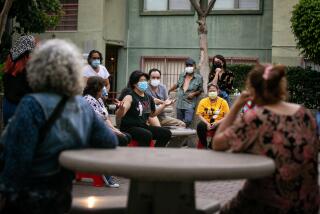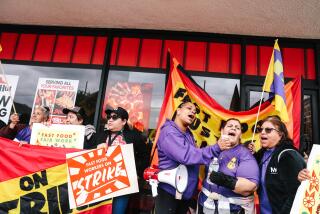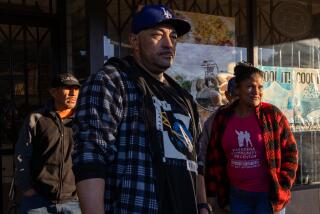Justice for Janitors campaigners record their stories
Rosa Ayala has been arrested seven times, endured three hunger strikes and marched in so many protests, she long ago lost track.
As the 67-year-old janitor was interviewed for an oral history project on Saturday, she sat proudly in a chair dressed from head to toe in her union’s symbolic red and told her story.
“I fight for our union’s cause because it comes from deep inside of me,” she said, an audio recorder a few inches away. “We will never be satisfied until we have respect and fair wages.”
Ayala joined more than 60 other janitors in a project organized by UCLA to record the history of the Service Employees International Union’s Justice for Janitors campaign, launched in 1987. The university has spent more than eight months tracking down photographs, news clippings, posters and, most significantly, oral testimonies.
In more than two decades, the union has won higher wages, health insurance, vacation and sick pay for its members. It also has organized campaigns for immigration reform and better healthcare.
“We’ve pushed to give our members a voice on all the issues that have long plagued the community,” said David Huerta, vice president of the janitorial division of SEIU United Service Workers West.
The janitors’ story took a pivotal turn in 1990 in Century City when police attempted to drive back protesters with clubs. Forty people were arrested and 16 injured.
That day Rina Valenzuela, 58, escaped the chaos and hid on the second floor of an office building. From there, she saw a co-worker named Ramon, a nice man who often helped her vacuum, beaten by police.
“It’s incredible to see how far we’ve come,” the Salvadoran immigrant said as she waited to be called in for her interview. “But we still have a long way to go. Every year brings new challenges.”
As janitors streamed into the union’s reception hall in South L.A., many wore their famous red T-shirts, the ones that became so popular in the 1990s that knockoffs were sold in the downtown fashion district.
Most of the workers interviewed had been janitors for one or two decades, in some cases three. Many were immigrants who came from impoverished countries, sometimes ravaged by war or political strife. That turmoil favored the union because many members were familiar with protests and sacrifice, said the union’s janitorial division president, Mike Garcia.
The janitors “led the first successful union movement among immigrant workers,” he said.
In 2000 — the same year janitors staged a nationwide protest, emptying out commercial office buildings — their story was captured on the big screen. A British director made “Bread and Roses,” a feature film that portrayed the janitors sympathetically.
Irene Garcia, 57, showed up at the oral history gathering with a red shirt she wore for the 2000 strikes. It was covered with the signatures of heavyweights she had met that day: the Rev. Jesse Jackson and Sen. Ted Kennedy, among others. She squeezed into her shirt as students turned on the digital recorder.
“I have a dream that one day people will know that when we clean out their trash cans and their desks,” she said, “we do it with love. We do it so they’ll come in the next morning and feel comfortable and feel good.”
Garcia’s interview and others will be posted online. Gaspar Rivera-Salgado, a labor studies professor who launched the project, said he hopes people will hear the histories and understand how widespread the janitors’ reach has been.
“It goes beyond issues of maintenance and labor,” he said. “They not only built a platform for political figures but also for religion and civil rights.”
esmeralda.bermudez@latimes.com
More to Read
Start your day right
Sign up for Essential California for news, features and recommendations from the L.A. Times and beyond in your inbox six days a week.
You may occasionally receive promotional content from the Los Angeles Times.







